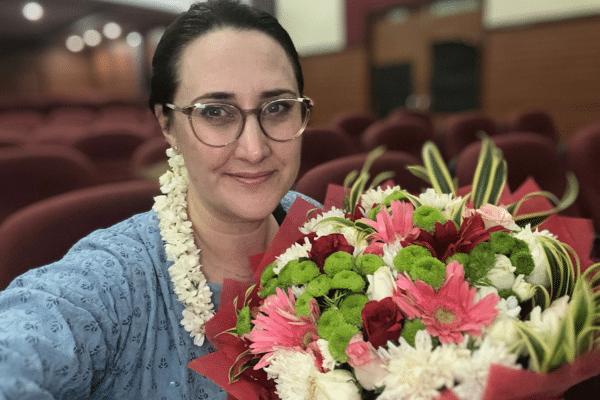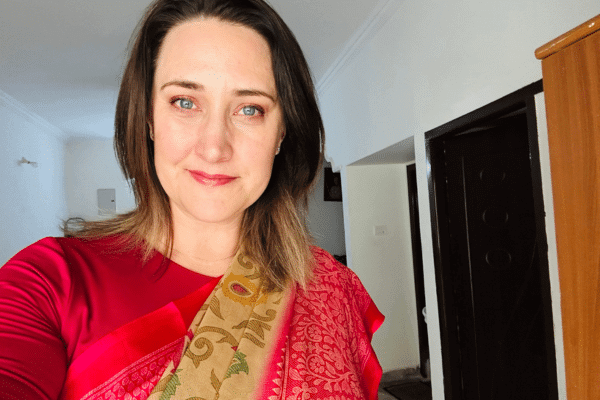Survivors of exploitation in rural areas of Telangana and Andhra Pradesh, India, will soon receive much-needed support through a groundbreaking research project led by Associate Professor Emma George from the University of Adelaide. Assoc. Prof. George, who received an Australia India ‘Unnati’ Research Collaboration Grant, aims to develop an enhanced model of care that addresses the physical, emotional, and social health needs of survivors while promoting empowerment for women, families, and communities. The project focuses on regions where women continue to face sexual servitude and exploitation.
Assoc. Prof. George explains, “These women are at risk of communicable diseases, have limited access to healthcare, poor nutrition, unwanted pregnancies, and experience social discrimination and isolation. We have an opportunity to enhance the important work already happening in local villages to empower women and develop context-specific approaches to trauma-informed care.”
To achieve this, the research team plans to adapt an occupational justice research tool to the Indian context and investigate occupational justice and rights for women recovering from exploitation. Assoc. Prof. George emphasises the significance of occupational therapy in supporting survivors’ recovery, stating, “Occupational therapy can make an important contribution in trauma-informed care for survivors of exploitation. The heart of occupational therapy is about helping people to do what they want and need to do in all areas of their life.”

The concept of occupational justice plays a crucial role in the research project. Assoc. Prof. George explains, “An occupational perspective on justice draws attention to the rights of all people to engage in activities that have meaning and purpose.”
The Occupational Justice Health Questionnaire (OJHQ) highlights fundamental human rights and restrictions to participation due to existing occupational injustices. The tool will be used to identify strengths and limitations in health and community services for women in recovery from exploitation.
As the principal investigator, Assoc. Prof. George will lead the research on the enhanced model of care for exploitation survivors in collaboration with Professor GVS Murthy from the Indian Institute of Public Health and Dr Beryl D’Souza from Good Shepherd Healthcare. The project aims to promote holistic approaches to recovery and empower women, families, and communities affected by exploitation.
The Australia India ‘Unnati’ Research Collaboration Grant, administered by the Australia India Institute and funded by the Australian Government Department of Education, seeks to strengthen research partnerships between the two countries. Assoc. Prof. George’s selection for this highly competitive grant underscores the significance of her work in the future of healthcare. The grant aims to deepen collaboration and enhance the impact of research initiatives.
Assoc. Prof. George expresses her aspirations for the research collaboration with Indian partners, stating, “I have been visiting India and learning with and from my research partners, and the communities they serve, for many years. This funding provides an opportunity for us to establish new partnerships across public health and occupational therapy and invest in an emerging scope of practice in India. I have seen incredible passion and commitment from occupational therapists, academics, researchers, and leaders to grow occupational therapy in innovative ways, and I am honoured to be a small part of that. This specific project is only one small step towards a larger vision for an enhanced model of care for survivors that is trauma-informed and includes occupational therapy. Opportunities to train others and provide learning opportunities for students (from India and Australia) is one way we can deepen research collaborations and promote long-term collaborations.”
She envisions the project as a stepping stone towards a larger vision for an enhanced model of care for survivors that is trauma-informed and includes occupational therapy.
The University of Adelaide’s support for survivors of exploitation in India reflects its commitment to making a positive impact beyond its borders. Through the research project led by Assoc. Prof. George and in collaboration with Indian partners, the university aims to contribute to the development of comprehensive and empowering support systems for survivors of exploitation. By addressing the physical, emotional, and social health needs of survivors and promoting their empowerment, the project paves the way for a brighter future for survivors in India.
The research project is just one of the twelve projects funded by the Australia-India ‘Unnati‘ Research Collaboration Grant. These projects, involving Australian researchers from nine universities and Indian partners from over twenty higher education institutions, research centres, and industry organisations, exemplify the growing research collaboration between Australia and India. Adelaide’s Prof. Emma George
The University of Adelaide, through Associate Professor George’s research endeavours and the collaborative efforts of the project team, aims to deepen research collaborations, foster knowledge exchange, and create lasting partnerships between Australia and India. The enhanced model of care developed through this project has the potential to transform the lives of survivors of exploitation and bring about positive change in their communities.
Read More: Maitri Cultural Partnerships grant: Forging new cultural connections





